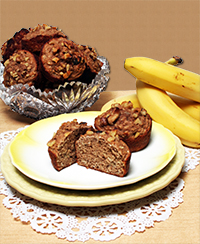It’s National Fiber Focus Month, a good time to start a new year’s habit of eating plenty of fiber each day from a plant-based diet – vegetables, fruits, whole grains, beans and nuts – to reduce your risk of colon cancer.
AICR’s expert report and its updates found convincing evidence that dietary fiber cuts risk for colorectal cancer. Fiber can also help you feel satisfied in a healthy way and that also may help you keep extra pounds at bay.
How much fiber is enough? Health experts recommend eating at least 25 grams of fiber every day through plant foods. Fiber-rich foods also take longer to digest, so your energy lasts longer between meals.
Choosing whole grains can give you at least double the fiber you’d get from white rice and white bread made with refined white flour. That’s because whole grains leave the germ and the bran in, which give you more fiber and cancer-preventive phytochemicals.
Finding Whole Grains
When you buy whole-wheat bread, make sure the ingredients list says “whole wheat” as one of the first ingredients, not just “wheat.” Whole-wheat bread, pasta and tortillas, plus brown rice, quinoa, bulgur, barley and oats are just a few of the delicious, nutty-tasting whole grains you can try.
Our recipe for Banana-Oatmeal Muffins uses whole-wheat pastry flour (or regular whole-wheat flour, if you can’t find pastry flour), oats and walnuts. Eat one of these muffins with a piece of fresh fruit to bulk up your breakfast with fiber. Add a little protein like low-fat yogurt, cheese or an egg for a complete meal.
 Banana Oatmeal Muffins
Banana Oatmeal Muffins
- 1 cup old-fashioned oats (not quick-cooking)
- 1 cup 1% or fat-free buttermilk
- 1 1/2 cups whole-wheat pastry flour
- 1 tsp. ground cinnamon
- 1 tsp. baking powder
- 1/2 tsp. baking soda
- 1/4 tsp. salt
- 1 large egg
- 1/2 cup applesauce
- 1 cup mashed ripe banana (about 2)
- 1/2 cup lightly packed light brown sugar
- 1/2 cup chopped walnuts
In large mixing bowl, combine oats and buttermilk and set aside for 1 hour.
Preheat oven to 400 degrees. Drop foil liners into 12-cavity muffin tin with 3-inch cups. Coat inside of liners generously with cooking spray and set aside. Or spray muffin tin without using liners to produce muffins with a chewier crust.
In small bowl, whisk together flour, cinnamon, baking powder, baking soda and salt. In bowl with soaked oats, break egg and beat lightly with fork, then mix in. Add applesauce, banana and sugar and stir until wet ingredients are well blended. Add dry ingredients, stirring just until they are combined (over-mixing will make muffins tough). Spoon batter into prepared muffin tin. Sprinkle walnuts over top of batter.
Bake for 20 minutes, or until toothpick inserted into center of muffin comes out clean. Let sit for 3 minutes, then turn muffins out onto wire rack and cool for 15 minutes. Serve warm. Note: If not using liners, run thin knife between muffins and pan before turning out.
Makes 12 muffins.
Per muffin: 180 calories, 4.5 g total fat (0.5 g saturated fat), 30 g carbohydrate,
5 g protein, 4 g dietary fiber, 180 mg sodium.






 Banana Oatmeal Muffins
Banana Oatmeal Muffins